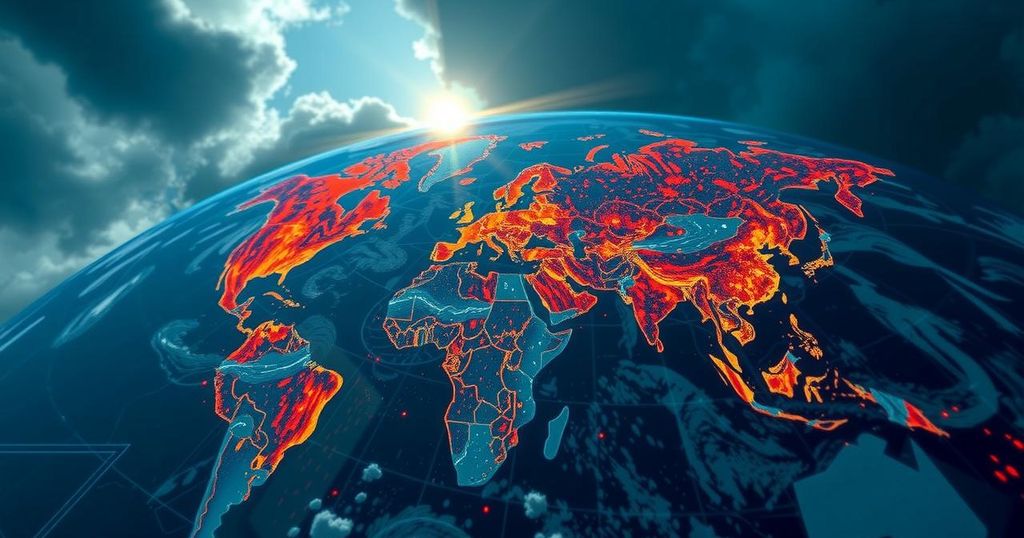A recent study reveals that climate change has intensified the ten deadliest extreme weather events in the past two decades, resulting in over 570,000 deaths across Europe, Africa, and Asia. Conducted by the World Weather Attribution group, this analysis highlights the importance of recognizing the role of global warming in extreme weather and the urgent need for political leaders to transition away from fossil fuels to prevent further suffering among vulnerable populations.
Recent analysis reveals that human-driven climate change has intensified and increased the likelihood of the ten deadliest extreme weather events recorded over the past two decades. This analysis, conducted by scientists from the World Weather Attribution (WWA) group at Imperial College London, indicates that over 570,000 lives were lost due to lethal storms, heat waves, and floods affecting Europe, Africa, and Asia. The study highlights a marked ability among scientists to identify the effects of climate change on complex weather occurrences, reaffirmed by re-evaluating extreme events documented in the International Disaster Database since 2004. Dr. Friederike Otto, co-founder and lead of the WWA, emphasizes the imperative for political leaders to acknowledge the damaging impact of fossil fuel combustion on climate systems, stating, “This study should be an eye-opener for political leaders hanging on to fossil fuels that heat the planet and destroy lives. If we keep burning oil, gas and coal, the suffering will continue.” Among the deadliest incidents was a drought in Somalia in 2011, which resulted in the deaths of over 250,000 individuals, with researchers concluding that climate change exacerbated the low rainfall contributing to the drought. The 2015 heatwave in France, which claimed over 3,000 lives, was also attributed to climate change, as the incidence of such extreme heat became twice as likely. Furthermore, the heatwaves in Europe during 2022 and 2023 resulted in 53,000 and 37,000 fatalities respectively, with the latter event being deemed impossible without the influence of climate change. The findings also connect climate change to severe tropical cyclones affecting Bangladesh, Myanmar, and the Philippines as well as catastrophic flooding in India. Experts caution that the actual death toll may be higher than the reported numbers due to inadequate record-keeping concerning heatwave-related fatalities in many vulnerable regions, particularly poorer nations. The WWA pioneered new methods for tracking the relationship between climate change and weather events, allowing researchers to rerun simulations to assess how events would unfold under current climate conditions versus a pre-industrial era. Dr. Otto and Dutch climatologist Geert Jan van Oldenborgh led this innovative approach, enabling a clearer understanding of the link between global warming and specific weather phenomena. The study serves as a stark reminder of the impact of climate change on weather patterns, highlighting the urgency for nations to enhance their resilience against associated risks. Roop Singh from the Red Cross Red Crescent Climate Centre conveyed a pressing warning: “The massive death tolls we keep seeing in extreme weather shows we are not well prepared for 1.3°C of warming, let alone 1.5°C or 2°C. With every fraction of a degree of warming, we will see more record-breaking events that push countries to the brink, no matter how prepared they are.”
The increasing frequency and severity of extreme weather events, such as heatwaves, droughts, and tropical storms, has been closely associated with human-induced climate change. As global temperatures rise due to emissions from fossil fuel combustion, scientists are becoming more adept at analyzing the relationship between specific weather events and the broader context of climate change. This recent analysis provides crucial insights into the human cost of climate inaction, emphasizing the essential need for impactful policy responses and increased resilience in vulnerable regions amid a changing climate.
In conclusion, the analysis conducted by the WWA underscores the critical consequences of human-caused climate change on weather patterns and the rising death toll associated with extreme events. It highlights not only the direct link between climate change and specific incidents but also raises the alarm on the inadequate preparation of nations to cope with these challenges. As scientists call for urgent action from policymakers, the findings reinforce the necessity for collective action to mitigate climate impacts and enhance the resilience of communities worldwide.
Original Source: www.bbc.co.uk






